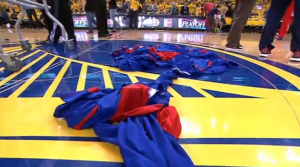The Power of Branding: How Professional Athletes Combat Racism
 This past Friday TMZ released an audio recording involving Donald Sterling, owner of the Los Angeles Clippers basketball franchise, and his girlfriend. During the recording, Sterling went on a racist rant after his girlfriend, who is ironically of African American and Hispanic descent, uploaded a picture to her Instagram account with basketball legend Magic Johnson, who is African American. During the clip, Sterling issued the following statements, among others:
This past Friday TMZ released an audio recording involving Donald Sterling, owner of the Los Angeles Clippers basketball franchise, and his girlfriend. During the recording, Sterling went on a racist rant after his girlfriend, who is ironically of African American and Hispanic descent, uploaded a picture to her Instagram account with basketball legend Magic Johnson, who is African American. During the clip, Sterling issued the following statements, among others:
"It bothers me a lot that you want to broadcast that you're associating with black people. Do you have to?"
"The little I ask you is not to promote it on [Instagram] . . . and not to bring [black people] to my games."
The news caused tremendous uproar, but was amplified because Sterling's Clippers are in the middle of a playoff tournament against the Golden State Warriors. The players, the majority of whom are black, had to decide whether to suit up for their scheduled Sunday game or boycott the match until the NBA had established punitive action.
With the weight of the public and media on their shoulders to take action against their owner, the Clippers decided to still play their scheduled Sunday game, but had a personalized pre-game response to the news.
After emerging from the locker room, all of the players and coaches walked to mid-court, took off their Clippers-branded jackets, and tossed them onto the floor. This revealed that the players had turned their warm-up gear underneath the jackets inside-out so that the word "Clippers" would not show.
While there are a myriad of PR components in play here, perhaps the most significant is the power of brand association.
Until recently, the Clippers' brand had long been a laughingstock in professional sports due to their consistently abysmal performance, frugality in paying for quality players, and overall organizational dysfunction. But over the past three years, management had made some game-changing concessions that turned the Clippers into one of the NBA's top teams. As such, they'd also become one of the more popular teams, with two players cracking the top 15 highest selling jerseys list.
Given this brand transformation, it is telling that players chose to protest their owner's comments by disassociating from the Clippers brand - "de-branding" if you will, rather than boycotting the game altogether. Just yesterday, the National Basketball Association did some de-branding of its own when they banned Sterling from the NBA for life, issued him a maximum-allowed $2.5 million fine, and warned that they will immediately lobby NBA owners to a vote that would force him to sell his team (this requires support of 75% of NBA owners).
However, the meaning behind both the Clippers' and the NBA's response becomes more interesting when compared with another recent incident. Racism, for example, has been a major issue in European soccer for quite some time. It is not uncommon for fans sitting closest to the pitch to jeer minority soccer players when they come in close proximity (e.g. taking a corner kick or throw-in) by making monkey noises and throwing bananas in their direction.
On the same Sunday that the Clippers played their first game after hearing their owner's comments, soccer titans Barcelona were playing rivals Villareal in Spain. Brazilian right back Dani Alves, who is black, was setting up to take a corner kick. As he was preparing, a Villareal fan threw a banana onto the pitch in front of him. Alves picked up the banana, unpeeled it, took a big bite, and proceeded with his corner kick as if nothing had happened (see clip here). He'd later assist on two of Barcelona's three goals that day in a 3x2 victory.
When asked about the incident, Alves simply replied that he had gotten so used to fans' racist behavior that he preferred to make light of the situation rather than give these fans what they wanted by becoming agitated. He then issued a call to action for soccer officials to crack down on racism.
So, rather than the de-branding we saw with the Clippers, Alves chose to re-brand the original racist action into an anti-racist message that went viral.
Both of these examples show that the strength of a cause, when properly communicated, is powerful enough to overcome the negative messages that triggered it. And in today's brand-centric world, properly managing a personal brand can generate tremendous public support and build platforms that empower the individual to stand-up against social injustices. ![]()
